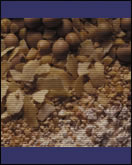Bodybuilding, Powerlifting, Supplements, and Equipment Super Store!
 Soy protein is the only plant protein that is "complete" because it contains all 9 essential amino acids in the right balance for your body's needs. This makes soy a great substitute for meats high in saturated fat and cholesterol.
Soy protein is the only plant protein that is "complete" because it contains all 9 essential amino acids in the right balance for your body's needs. This makes soy a great substitute for meats high in saturated fat and cholesterol.
Soybeans are rich in many naturally-occurring phytonutrients including isoflavones and saponins. In combination with soy protein, these phytonutrients are thought to play a critical role in the health benefits of consuming soy.
Isoflavones can be found in varying amounts in legumes, such as chick peas and lentil, but soybeans contain the highest natural concentration of isoflavones. Soy contains three types of isoflavones: Daidzein, Genistein and Glycitein. Each is found in different amounts in the soybean and each has different properties.
Textured soy protein is made from defatted soy flour that is compressed and processed into granules or chunks. It is sold in health-food stores as a dried, granular product, but most often shows up in veggie burgers, veggie sausage, veggie coldcuts and other vegetarian version of meat products.
Sense Soy Protein is not a necessity there are no deficiencies. Women tend to benefit most from soy protein but men will benefit as well. New research is being conducted in the field of male health and the use of soy protein and researchers are very optimistic that a lot of positive things will come of it.
Practical implications. Emerging research indicates that soy protein intake has a significant favorable effect on serum lipid levels(cholesterol) and may reduce risk for atherosclerotic cardiovascular disease(Heart Disease).{1,3,8,11,15,16}. The role of soy protein as a protective factor versus breast and prostate cancer is under intense investigation.{10,15} Substituting soy protein for animal protein appears to have protective effects for the kidney, especially for individuals with diabetes.{2} The role of soy protein in reducing menopausal symptoms is also under investigation.{10} Finally isoflavone analogues appear to reduce risk for and have therapeutic value for persons at risk for osteoporosis.{3,10}. Based on this scientific evidence {3} we suggest these guidelines for soy protein intake.
For persons in good general health a suggestions is to have 7 servings of soy protein per week. (1) This would provide an average of approximately 8 to 10 grams of soy protein daily with 16-20 mg of soy isoflavones daily. This could be obtained from 8 oz. of soy beverage daily, or two soy muffins daily, or two servings of tofu four times weekly, or four soy burgers weekly, or 1 tablespoon (14 g.) of isolated soy protein stirred into beverage daily.
The Japanese, who have low rates of breast and prostate cancer, consume daily 20-80 mg of genistein, a phytochemical almost entirely derived from soybeans. But in the United States, the daily dietary intake of genistein is only 1 to 5 mg.
When Japanese Women move to the United States and consume the standard American diet, their risk of breast cancer increases dramatically. Previously, doctors thought that this was because of the high fat content of the western diet, but new studies fail to show a significant link between dietary fat and breast cancer risk. Some researchers now think that the increase in breast cancer results from a diet that is deficient in soy isoflavones.
Genistein and other soy components provide anticancer protection by the following mechanisms: - Blocking the cell mutating actions of pesticides, herbicides, fungicides and other pollutants by preventing their binding to estrogen-testosterone cell receptor sites in the breast and prostate.
The following forms of cancer have been shown to respond favorably to soy adjuvant therapy:
Other Medical Benefits of Soy
According to published studies, the daily intake of sufficient soy isoflavones may:
Bibliography
Soy Protein Products